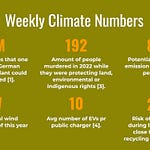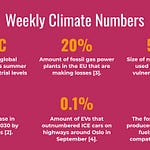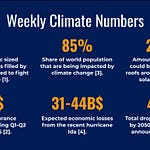Welcome to this weeks edition of The Weekly Climate 🎉
References: [1], [2], [3], [4] and [5].
‼️News you can’t miss
Here’s one scary/bad (🙀), good (😻), interesting (😼) and fossil (💩) news item.
🙀 If you’re wondering about the negative effects the climate crisis has on your health, New York Times has a detailed list.
😻 Some things are actually going better in the fight to solve the climate crisis than the worst predictions laid out.
😼 Steel plants have a big footprint and this week Grist looks at the paths that steel plants have to decarbonize.
💩 The fossil fuel industry is busy pushing propaganda using their favorite PR companies about what Biden’s climate action really means.
👩⚕️ Status: Climate & Science
Let’s look at how we’re doing this week!
[#iceberg] — A new study has found a connection between how far north icebergs travel and the triggering of ice ages. The basic theory which the study found evidence of being true is that the icebergs release of fresh water affects ocean currents which might cause changes in the oceans ability to sequestrate carbon.
[#bushfires] — Now that we’re done looking at US wildfires (although many are still burning) we can turn our attention to Australian bushfires. A particular large one are burning close to Perth and have already destroyed more than 70 homes and 20000 acres. Can you imagine living in a country like this and where the government is literally saying “Nah it’s no problem — let’s burn fossil fuels until we’re out of it”.
[#cyclone] — In just one month Fiji suffered it’s second deadly storm with tropical cyclone Ana. More than 10.000 people are remain in emergency evacuation centers due to the two storms.
[#floods] — California’s weather has quite the mood swings. If it’s not pounded by blistering heat then it’s torrential downpour. And such downpour is wreaking havoc in the state resulting in floods and mudslides due to the soil being heavily eroded from heat, fire and misuse.
📰 The 7 Grand Challenges
⚡️Decarbonize Electricity
Clean electricity is the one do-or-die challenge we must solve.
[#residentialsolar] — A hawaiian utility launched a “Quick connect” scheme which enables home-owners to, yes you guessed it, quickly connect their rooftop solar. During the pandemic, Hawaiian rooftop solar installation rose by over 55%. And this new scheme makes it possible for people to just install their systems and then do the necessary paperwork afterwards. Earlier there would be week or month long wait before the paperwork would be completed to allow customers to turn their new systems on.
[#solar] — In one of the first newsletters I did I posted a new record beaten by a perovskite-based solar cell. This article looks at this wonderful new material.
[#waveenergy] — Exciting new wave technology is being tested off the coast of a Tasmanian Island. The technology harvests waves through a kind of blowhole (think whales) that compresses air inside a chamber which then powers a turbine.
[#microgrids] — PG&E, the utility in California, that has been under fire for causing many of the wildfires due to equipment failure has a new idea to stop this trend. Remote grids — or usually called microgrids. Basically, isolated parts an electricity grid that can power a small area based on local and distributed power generation.
🏘 Reduce impact of urban and rural areas
Lowering the impact of urban and rural areas.
[#ev] — Italy is not known for having the cleanest cars, but in 2020 that looks like its about to change as the EV (note this does not include hybrids) 3x’ed in 2020 from previous years. UK is also starting to show good numbers in this category with their market being up 2x from last years.
[#ice] — In a somewhat unexpected move big car makers such as Toyota, Fiat Chrysler and others have said that they will no longer try to block California from setting its own strict fuel-economy standards. Late last year the governor issued a total ban on fossil fuel cars by 2035.
[#buildings] — Buildings are responsible for ~13% of greenhouse gas emissions and a lot of that is due to heating and cooling. A simple solution that will help manage that is known as dynamic glass, in which a micro-thin coating is put on windows which allows residents to reduce glare and therefore heat without just cranking up the AC.
[#hydrogen] — This article should hammer home why hydrogen powered cars really make very little sense. At least if you look at it from an energy efficiency perspective.
🛁 Clean non-electrifiable activities
Some activities we do today can’t be electrified, these must be cleaned some other way.
[#hydrogen] — A new report suggests that the Green Hydrogen revolution will come faster than anyone expects. We’re already seeing a lot of green hydrogen deployments worldwide with for instance EU targetting 40GW by 2030.
[#steel] — Steel plants are responsible for about 8% of global carbon emissions and this Grist article goes into detail about the different paths that industry has to decarbonize. The basic problem is that making steel from iron ore requires a lot of heat and traditionally this heat has come from burning coal. New technologies looks at everything from high power currents to hydrogen to create that heat.
🌳 Protect and grow nature
Nature is our ally, we must protect it and help it help us.
[#satellite] — A look at NASAs project and their technology to help quantify forests impact on the global carbon budgetn and how they intend to continue doing that in the future.
[#finance] — A new report puts it rather bluntly that we have been taking from Mother Nature valuable things that should have been paid for. We humans just take stuff. Food, fuel, trees, minerals, rocks, everything and in return we try to kill ourselves and Mother Nature by polluting it. The report instead turns it around and says that we need to look at Mother Nature as an asset, something we need to pay to “use”.
[#conservation] — Grist looks at the peculiar case of the drilling leases for the Arctic Wildlife Refuge and looks at the issues with so called conservation leasing, i.e. when a company leases the land just to conserve it instead of drilling. This has been tried by conservationists before and unfortunately failed.
🍽 Optimize food
Without the lower impact of food or drink the hero doesn’t work (modified old danish proverb).
[#diet] — A new report by UN-backed Chatham House says that switching to a plant-based diet is crucial not only to saving global wildlife but also to curb greenhouse gas emissions. 80% of all agricultural land is used for livestock (but the livestock only provide 18% of calories eaten) and it’s this land grab that’s threatening global wildlife populations.
⚖️ Climate Justice
Without justice there’s no future.
[#biden] — As the US appear to put up a solid plan for rapid decarbonization, Vox notes that it’s important that the energy transition becomes just and equitable, by referring to the ‘yellow vest’ protests in France a few years ago. Both of these issues meet on Sedrick’s Rowe’s farm in the state of Georgia. This article goes really well together with “🎧 How to save a planet’s” recent episode on this exact topic. Take a listen if you haven’t already.
[#france] — A French court finally convicted the French government for not meeting it’s climate goals. This is being called a historic victory as the reason for convicting the governments probably matches the situation in a lot of other countries. Basically, the government promised 1.5% reductions in emissions, but instead increased them by 4%.
[#newmexico] — A personal look at what some families in New Mexico must live with because they live close to an oil and gas production facility. I can’t imagine living in a constant state of fear and pollution like this.
⬇️ Drawdown
Removing carbon from the atmosphere one way or another.
[#ccs] — Inconveniently at the same week as Exxon announced a 3B$ investment in carbon capture and storage, the U.S just closed it’s only carbon capture plant, Petra Nova. The project died after barely 4 years in operation. The project was not direct air capture but scrubbed the CO2 from a smokestack and not even such a project has proven to be profitable.
📦 Other / catch-all
All the other stuff that I couldn’t fit into any of the other categories, than the other category.
[#anxiety] — Climate anxiety is unfortunately a thing. Especially among young people. New York Times dives into the topic and highlights a couple of people working on that. Among them Britt Wray, who has an excellent newsletter called Gen Dread. Check that out.
[#hegglar] — If you haven’t already subscribed to Mary Annaïse Hegglar’s newsletter and podcast Hot Take, you should! Here Atmos / Frontline interviews her about her journey into the climate space as well as what it means to be a black woman in climate. Highly recommended!
[#notdoom] — A rare and sobering look at what’s actually going in the right direction for the solving the climate crisis. Here environmental reporter Emma Harris reports that although extinctions are a big problem, it’s nowhere near what we feared and that things are looking up on the policy side. At least for now...
⭐️Special Topics
🎩 Global and local policy
We have a special interest in covering the major global and local policies regarding climate, whether good or bad.
[#china] — In what is seen as a welcoming diplomatic move by China, the climate veteran Xie Zhenhua was re-instated as China’s special climate envoy. Xie and the U.S. climate envoy John Kerry already has a very good relationship and it’s therefore seen as positive diplomatic move by China.
[#australia] — Australia publishes a “do-nothing” document that outline the governments arguments for not doing anything to accelerate the shift to cleaner modes of personal transportation. And yes it’s the good ol’: Let the market handle it. I’ve been bashing Australia before because of their poor climate policies. And I’m not alone. A new report by BNEF reveals that Australia’s climate policies is indeed the worst of the major developed economies studied.
[#us] — Here’s a great and detailed comparative study from the Guardian of Biden vs Trumps’ environmental policies. Yes the news here is not that Biden is better but rather the actual actions that he’s taking.
⛽️Major Carbon Emitters
We have a special interest in covering the moving of the major carbon emitters as these are the key roadblock to climate action.
[#coal] — Interview with the CEO of one of the largest utilities in the US, NextEra, about the fact that coal is dead. In fact he says that: “There is not a regulated coal plant in this country that is economic today”. The reason: Competition from cheaper alternatives such as solar, wind and unfortunately, but still a tiny bit better than coal, fossil gas.
[#fossilceo] — Are you wondering what top level fossil fuel industry execs thinks about their current situation? Then look no further. New York Times reflects on recent statements by Exxon and BPs CEOs. And at least it looks like one of them is at the very very least SAYING the right things.
[#exxon] — Like the rest of us (although in different ways) Exxon is in hot water due to it’s lack of will to adapt it’s business model to the climate crisis. Investors are not impressed and are pushing Exxon to do more. On Monday, Exxon announced an expected move which was to pour 3B$ into a programme for researching carbon capture and sequestration. For the record that’s about 1% of it’s revenue that it pours into technology that could keep it going even during a climate crisis. I’m not the only one seeing this.
[#bakkenoil] — Not all crude oil are made equal. Bakken oil (named after the area the oil is coming from) is apparently a very dangerous type, which in a recent train accident on December 22 caused a major fire and oil spill even though the train was going at the breakneck speed of 7 mph (11 km/t). Efforts to regulate it in the US have so far been invain.
[#health] — New York Times dives into how climate change affects your health negatively and hereby echoes the words of the studies that piling up about how air pollution from burning fossil fuels is killing us faster than climate change really is. Everything from asthma to cancer, it’s all in there.
[#propaganda] — A great interview with the amazing Genevieve Guenther about her work to End Climate Silence and what we’re seeing in terms of propaganda in response to Biden’s actions on climate. Related, a Heated investigation have shown that Twitter is letting the fossil fuel industry violate it’s ban on political ads.
[#exxon] — Exxon is going down. In 2020 it reported a loss of 22B$ and perhaps the most shocking of all is that it keeps on laying off employees why desperately taking on more than 4B$ in extra debt to pay a big dividend to shareholders. Who in their right minds would front those 4B$? It’s probably somebody’s pension fund coughing up those 4B$. BP is only doing better in comparison with Exxon’s horrible performance clocking in a loss of “only” 5B$.
[#china] — In rather exciting move, the central government of China has criticized it’s National Energy Administration for promoting the current aggressive coal power expansion citing that doesn’t align with the government environment goals. As reported in the last couple of newsletters, China has come under fire after it was revealed that it has tried to hide the rapid expansion of coal power plants in remote areas of the country. Will be exciting to follow what the result of this will be.
That’s it for this week folks! Remember if you’re feeling down, angry or sad from some of the news in this newsletter one cure is to act. And one way you can always act that also happens to be one of the most powerful things you can do is to talk about it. That also works if what you just read made you hopeful or happy btw.
If you enjoyed this newsletter don’t forget to share it with your friends, coworkers or other people you think could benefit from getting it. If you got directed here by a friend or another link on the Internet don’t forget to subscribe!
See you all next week 👋












